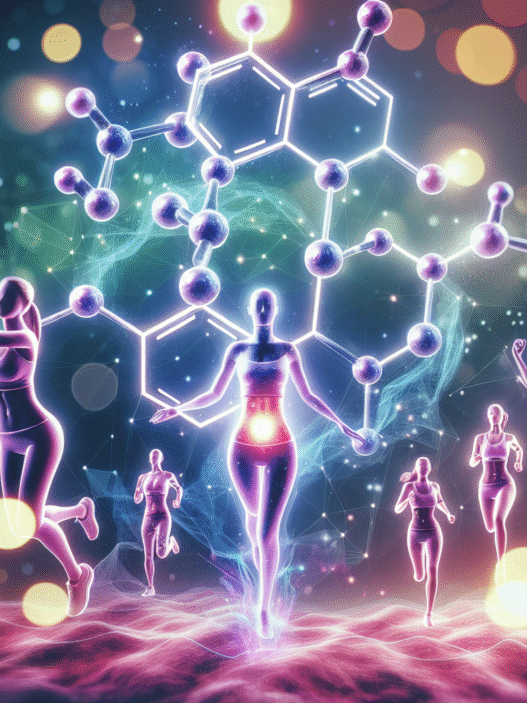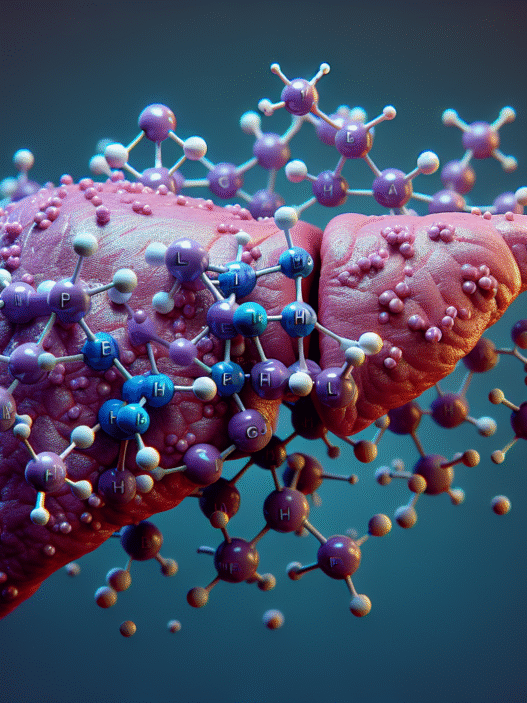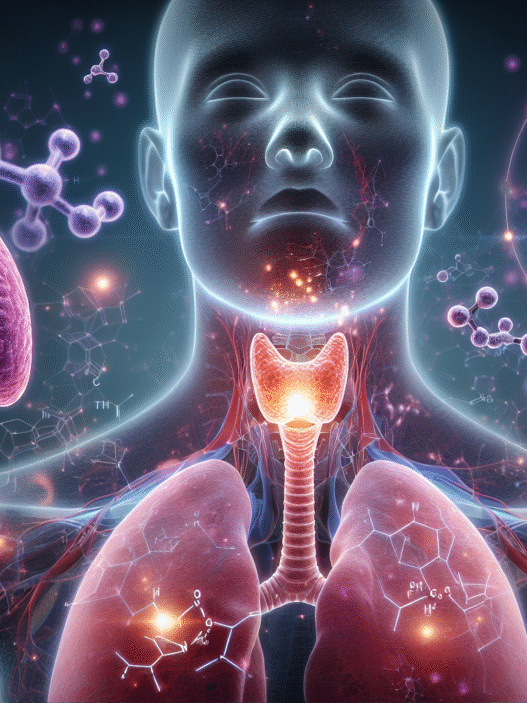Understanding Resveratrol
Resveratrol, a polyphenol found in various plants, has garnered attention for its potential health benefits, particularly regarding hormonal interactions. This section explores how resveratrol interacts with estrogen receptors and its broader hormonal modulation effects.
Estrogen Receptor Interaction
Resveratrol interacts with both genomic and non-genomic activities of the estrogen receptor (ER). It regulates several enzymes involved in steroidogenesis and competes in estrogen metabolism, potentially influencing the equilibrium of steroidal hormones. According to research, a daily consumption of 0.5 to 1 gram of resveratrol, often found in supplements at dosages up to 1000 mg per serving, can achieve plasma levels that initiate estrogenic activities observed in laboratory settings (PubMed).
| Resveratrol Dosage | Plasma Levels Induced |
|---|---|
| 0.5 g/day | Low estrogenic activities |
| 1 g/day | Sufficient for significant estrogenic activities |
Hormonal Modulation Effects
Research indicates that resveratrol interacts not just with nuclear estrogen receptors but also with membrane-bound estrogen receptors. This interaction showcases its diverse estrogenic activities. The hormonal modulation effects of resveratrol can shift the balance of estrogens and steroid hormones, potentially establishing a new operational set point. This alteration may provide therapeutic advantages, such as relieving menopausal symptoms like joint pain, hot flashes, mood swings, and cognitive changes by enhancing estrogen balance and reducing inflammation.
Moreover, resveratrol contributes to hormonal balance by inhibiting the enzyme aromatase, which regulates testosterone levels in women. Proper testosterone levels are essential for muscle mass maintenance, libido, mood stability, and overall energy levels.
For more insights into the effects and benefits of resveratrol, the following articles may be of interest:
- what are the benefits of taking resveratrol?
- does resveratrol help hair growth?
- what are the negative side effects of resveratrol?
Resveratrol Consumption Effects
Understanding the effects of resveratrol consumption is essential for those interested in its potential health benefits. This section delves into how resveratrol impacts plasma levels and its estrogenic activities.
Plasma Levels Impact
When resveratrol is consumed, typically at doses of 0.5-1 g per day, it can lead to plasma levels that are sufficient to initiate its estrogenic activities as observed in vitro. Many commercial supplements offer dosages of up to 1000 mg per serving, making it easier for individuals to achieve these levels (PubMed). The following table outlines various common dosages and their potential plasma level effects:
| Dosage (mg) | Potential Plasma Levels | Estrogenic Activity Initiation |
|---|---|---|
| 250 | Low | No |
| 500 | Moderate | Yes |
| 1000 | High | Yes |
Estrogenic Activities
Resveratrol exhibits estrogenic activities by interacting with both membrane-bound and nuclear estrogen receptors. These interactions can provide various health benefits related to hormone balance and alleviation of menopausal symptoms, such as joint pain, hot flashes, and mood swings.
While studies suggest these positive effects, it is important to note that resveratrol intervention did not alter serum estrogen or testosterone concentrations in postmenopausal women with high adiposity. However, it significantly increased the concentrations of sex hormone-binding globulin (SHBG), which is considered an inverse breast cancer risk factor.
The capacity of resveratrol to modulate estrogen activity may help support overall hormonal balance. This balance is crucial for not just women experiencing menopause, but also for maintaining healthy testosterone levels in women by inhibiting the enzyme aromatase, vital for muscle mass and mood stability (Dr. Brighten).
For further information about the benefits of resveratrol, refer to our article on what are the benefits of taking resveratrol?. Understanding these consumption effects is a significant step towards exploring how resveratrol may contribute to holistic wellness.
Health Benefits of Resveratrol
Resveratrol, a natural compound found in numerous plants, has gained attention for its potential health benefits, particularly in relation to inflammation and heart health. This section explores two notable properties: anti-inflammatory effects and cardioprotective benefits.
Anti-inflammatory Properties
Resveratrol is recognized for its ability to help reduce inflammation in the body. Chronic inflammation is linked to various diseases, including heart disease and cancer. Studies show that resveratrol may suppress inflammatory pathways, providing a natural alternative for those seeking to manage inflammation (WebMD).
| Health Benefits | Mechanism |
|---|---|
| Reduction in inflammatory markers | Modulation of immune response |
| Relief from menopausal symptoms | Alleviation of joint pain, hot flashes, and cognitive changes by supporting estrogen balance and reducing inflammation (Dr. Brighten) |
Cardioprotective Effects
Resveratrol is also known for its potential to protect the heart. It can lower bad cholesterol levels and improve blood circulation by preventing blood clots, which can subsequently reduce the risk of heart attacks. These cardioprotective effects position resveratrol as a beneficial supplement for overall heart health.
| Cardiovascular Effects | Benefits |
|---|---|
| Lowering bad cholesterol | Reduces risk of heart diseases |
| Inhibition of blood clotting | Enhances blood flow and reduces heart attack risks (WebMD) |
Overall, the health benefits of resveratrol extend beyond inflammation and heart health. Its role in balancing hormone levels and contributing to holistic wellness continues to be studied. For more insights on the benefits of resveratrol, visit what are the benefits of taking resveratrol?.
Resveratrol and Hormone Balance
Understanding the effects of resveratrol on hormone levels is important for individuals seeking natural health solutions. This section discusses how resveratrol impacts estrogen levels and regulates testosterone.
Impact on Estrogen Levels
Resveratrol interacts with estrogen receptors (ER) and modulates both genomic and non-genomic activities, potentially affecting the balance of steroid hormones. According to studies, consumption of 0.5-1 gram per day of resveratrol can lead to plasma levels sufficient to trigger estrogenic activities observed in vitro.
The following table summarizes the effect of resveratrol on estrogen levels:
| Dosage of Resveratrol | Effect on Estrogen Levels |
|---|---|
| 0.5 – 1 g | Initiates estrogenic activities (in vitro) |
| 1 g (postmenopausal women) | favorable effects on estrogen metabolism without significant serum changes in estradiol or estrone (Journal of Translational Medicine) |
Resveratrol may support healthy estrogen balance, offering benefits for women experiencing menopause and hormonal imbalances. These benefits can include relief from symptoms such as joint pain, hot flashes, and mood swings.
Testosterone Regulation
In addition to its effects on estrogen, resveratrol influences testosterone pathways. For both men and women, maintaining balanced testosterone levels is crucial for overall health. Resveratrol has demonstrated the ability to support healthy testosterone levels, which can enhance energy and overall vitality.
Studies suggest that resveratrol does not drastically change serum concentrations of testosterone but might support the binding of sex hormone-binding globulin (SHBG) in postmenopausal women who are overweight or obese.
The following table provides a brief overview of resveratrol’s role in testosterone regulation:
| Hormone Type | Effect of Resveratrol |
|---|---|
| Estrogen | Supports healthy estrogen levels |
| Testosterone | Assists in regulating testosterone pathways |
In summary, resveratrol appears to interact with the hormonal systems of the body in a supportive manner. Those interested in the potential benefits of resveratrol can explore more information through the article on what are the benefits of taking resveratrol?.
Resveratrol and Estrogen Metabolism
Exploring the relationship between resveratrol and estrogen metabolism reveals important insights into how this compound may influence hormonal balance.
Resveratrol Metabolites’ Effects
Resveratrol is metabolized in the body into several compounds, with the predominant sulfate conjugate metabolite demonstrating notable estrogenic activities at the cellular level. This indicates that the metabolites of resveratrol may be implicated in its estrogen-like effects (PubMed).
One such metabolite, piceatannol, has shown beneficial properties, including anti-inflammatory effects by inhibiting COX-2 expression. This action can lead to reduced synthesis of prostaglandin E2 and help prevent apoptotic cell death induced by oxidative stress (NCBI).
| Metabolite | Effects |
|---|---|
| Resveratrol | Estrogenic activity |
| Piceatannol | Anti-inflammatory, antioxidant |
Estrogen Metabolism Modulation
Research indicates that resveratrol may also modulate estrogen metabolism in various ways. In a pilot study, administration of a 1 gram daily dose of resveratrol for 12 weeks did not significantly affect serum concentrations of estradiol or testosterone, but it led to an average 10% increase in serum concentrations of sex steroid hormone binding globulin (SHBG) among overweight and obese postmenopausal women (Journal of Translational Medicine). Increased SHBG levels may be associated with a lowered risk of breast cancer.
Moreover, resveratrol was found to significantly elevate urinary 2-hydroxyestrone (2-OHE1) levels by an average of 73% in postmenopausal women with high body mass index, reflecting a positive change in the 2-OHE1/16α-OHE1 ratio. This finding suggests that resveratrol influences how estrogen is utilized and metabolized in the body.
Understanding these effects is essential for individuals considering resveratrol supplements for its health benefits, particularly in relation to hormonal balance. For more insights on resveratrol, visit our guide on what are the benefits of taking resveratrol?.
Resveratrol in Skin Health
Resveratrol, a potent antioxidant, has gained attention for its potential benefits in skin health, particularly in anti-aging and overall dermal wellness.
Anti-Aging Potential
Resveratrol is believed to activate the SIRT1 gene, which is associated with protecting the body against aging-related diseases (WebMD). This activation may contribute to its anti-aging effects, as it helps combat oxidative stress and inflammation that can lead to skin aging.
In terms of skincare, resveratrol’s antioxidant properties may reduce the appearance of fine lines and wrinkles, promoting a youthful complexion. Studies suggest that resveratrol can enhance skin elasticity and hydration, making it a popular ingredient in age-defying products.
| Benefit | Description |
|---|---|
| Reduces oxidative stress | Protects skin cells from damage caused by free radicals |
| Improves skin hydration | Enhances moisture retention in the skin |
| Promotes elasticity | Supports skin firmness and reduces fine lines |
Impact on Dermal Health
Resveratrol may help improve overall dermal health by reducing inflammation and promoting a balanced skin tone. Its ability to inhibit inflammation can help alleviate skin conditions, reducing redness and irritation. Additionally, it is suggested that resveratrol can aid in regulating insulin sensitivity, which may indirectly contribute to healthier skin, as insulin resistance can impact skin health in various ways (WebMD).
Furthermore, resveratrol can help prevent the degradation of collagen and elastin, essential proteins for maintaining skin structure. By doing so, it supports a more youthful appearance and can even assist in the healing process of minor skin injuries.
| Dermal Health Benefit | Description |
|---|---|
| Reduces inflammation | Alleviates redness and irritation |
| Supports collagen health | Aids in maintaining skin structure |
| Enhances skin tone | Promotes an even complexion |
Natural health seekers often explore the benefits of resveratrol as part of their holistic wellness routine. For more information on its advantages, check our article on what are the benefits of taking resveratrol?. Those considering resveratrol for skin health should also look into combining it with other nutrients and lifestyle factors to maximize its effects on overall wellness.





















